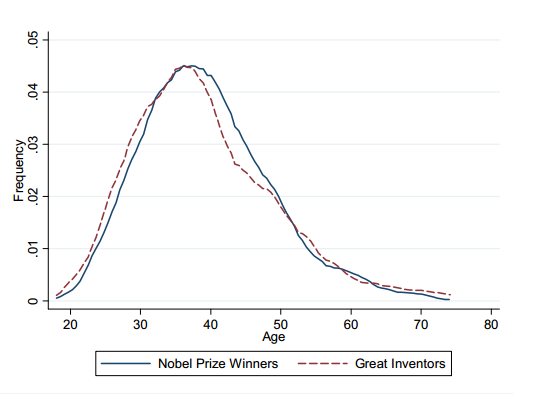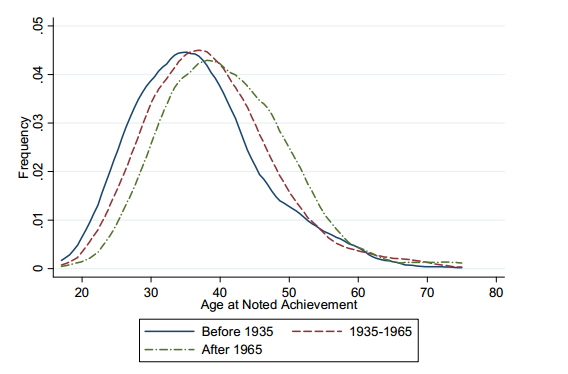WEEKEND READING: On Age and Scientific Genius
Building on one of the themes of the blog, i.e., the changing nature, demographic and otherwise of the modern workforce, I submit for your weekend long-reading consideration a recent National Bureau of Economic Research working paper titled Age and Scientific Genius, by Benjamin Jones, E. J. Reedy, and Bruce A. Weinberg.
In the paper, the authors examine the relevant literature to determine the relationship, if indeed one exists, between age and great scientific discovery, or 'genius.' Note: Nobel Prizes and great inventions are used as proxies for 'genius' in this analysis.
Turns out there is a relationship, and it might be a little different than your think, and most interestingly, it might be changing.
Take a look at the first of two charts from the paper. First, the 'headline' chart tracking 'genius' against age:

So genius peaks at about 40 or so, then literally and figuratively falls off a cliff as we age.
That can't be good news for one, many of the folks that are reading this post; and two, for workplaces overall that as we have explored before here on the blog, are more and more comprised of 'older' workers.
But maybe the news is not all bad for those 40-plussers. Take a look at how the genius/age relationship is changing over time.
 According to the researchers, and like everyone else, geniuses are getting older.
According to the researchers, and like everyone else, geniuses are getting older.
Or said differently, geniuses used to be younger. The peak age for great scientific achievements keeps moving to the right of the curve, particularly since 1965.
So if this trend continues, maybe it is good news for those of us staring at, or even looking back upon, our peak genius years.
On Age and Scientific Genius is an interesting look at the effects of time and generational shifts on the production of great scientific work. Take a look at the paper over the weekend if you have some time, I think even you can spare a few minutes before getting back to the workshop or laboratory.
Have a great weekend!

 Steve
Steve

Reader Comments (2)
Could it be that we're living a bit longer and there are more people in the older age groups and therefore more opportunities for the older crowd? Plot this against actuarial tables and see if they match up.
There used to be more teenage mothers/fathers too... isn't this just an overall shift in demographics and has nothing to do with when "genius" peaks?
I have to dig in to the data a little bit more, but I think that it was not just a function of 'there are more older people now, so therefore we have more older geniuses now too', but it is a good point if indeed that is the case.